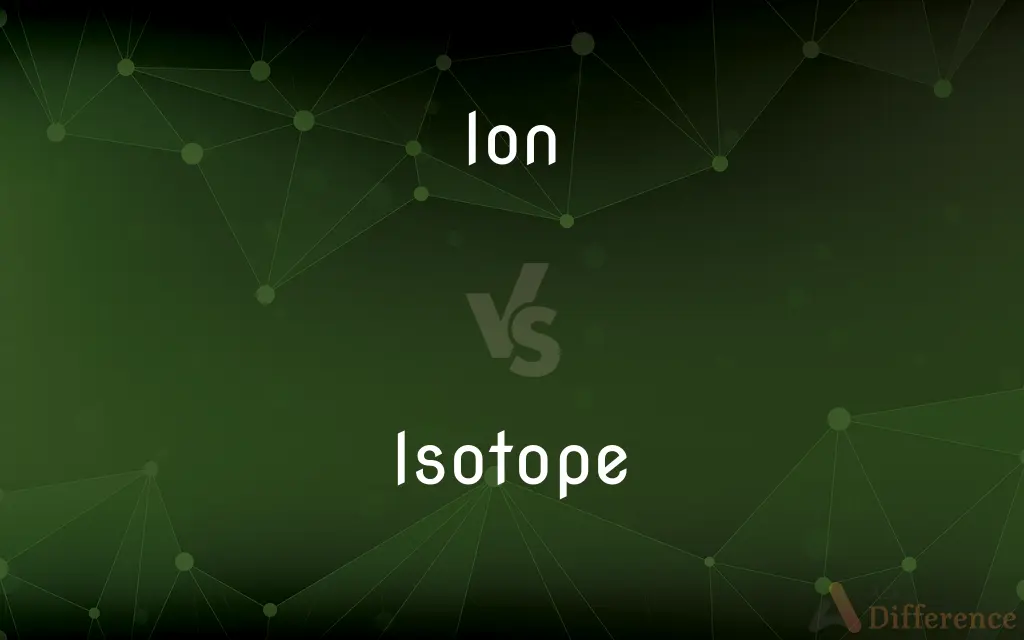Ion vs. Isotope — What's the Difference?
By Tayyaba Rehman — Updated on October 28, 2023
An "ion" is an atom or molecule with an electric charge due to lost or gained electrons. An "isotope" is a variant of an atom with a different number of neutrons but the same number of protons.

Difference Between Ion and Isotope
Table of Contents
ADVERTISEMENT
Key Differences
An ion is fundamentally an atom or molecule that does not have a neutral charge. This imbalance in charge arises when an atom or molecule either gains or loses electrons. The gain or loss of these negatively charged subatomic particles results in a positive or negative charge, respectively. Isotopes, on the other hand, have no connection with the charge of an atom. They relate to the number of neutrons within the atom's nucleus.
When discussing isotopes, one is referring to the variants of a particular chemical element. These variants differ in the number of neutrons present in the nucleus, but they retain the same number of protons. Hence, isotopes of an element have the same atomic number but different atomic masses. Unlike ions, the concept of isotopes revolves around the atomic nucleus rather than the electron configuration.
It's crucial to note that while ions and isotopes both refer to atoms, they describe very different phenomena. Ions represent atoms or molecules that have deviated from electrical neutrality. This can occur in various settings, such as during chemical reactions. Isotopes, conversely, provide insight into the natural variations present in elements and their implications in fields like radiology.
In summary, while ions and isotopes are both essential concepts in the realm of chemistry and physics, they address different aspects of atomic structure. An ion's identity stems from its charge due to electron changes, while an isotope's distinction arises from varying neutron numbers in the atomic nucleus.
Comparison Chart
Definition
Atom/molecule with a charge
Variant of an atom with different neutron count
ADVERTISEMENT
Cause of Variation
Gain or loss of electrons
Difference in neutron number
Relates to
Electrons
Neutrons in the nucleus
Charge
Can be positive or negative
Neutral
Examples
Na⁺ (sodium ion), Cl⁻ (chloride ion)
Carbon-12, Carbon-14 (isotopes of carbon)
Compare with Definitions
Ion
A non-neutral atom resulting from electron variations.
H⁺ is a hydrogen ion missing one electron.
Isotope
An elemental variation based on nuclear composition.
Chlorine has two major isotopes, chlorine-35 and chlorine-37.
Ion
A charged particle due to electron loss or gain.
The calcium ion (Ca²⁺) has lost two electrons.
Isotope
A version of an atom with the same protons but different neutrons.
Hydrogen has three isotopes: protium, deuterium, and tritium.
Ion
An atom or molecule with an electric charge.
NaCl dissociates into the Na⁺ ion and Cl⁻ ion in water.
Isotope
An atomic form differing in its neutron count.
Iodine-131 is an isotope used in medical treatments.
Ion
An electrically imbalanced atom or molecule.
In batteries, ions move between electrodes to generate power.
Isotope
An atom variant differing in neutron number.
Carbon-14 is an isotope of carbon used in radiocarbon dating.
Ion
A species with a net electric charge.
The fluoride ion (F⁻) is formed when fluorine gains an electron.
Isotope
A form of an element with a unique atomic mass.
Uranium-235 is a less common isotope of uranium.
Ion
An ion () is a particle, atom or molecule with a net electrical charge. The charge of the electron is considered negative by convention.
Isotope
Isotopes are two or more types of atoms that have the same atomic number (number of protons in their nuclei) and position in the periodic table (and hence belong to the same chemical element), and that differ in nucleon numbers (mass numbers) due to different numbers of neutrons in their nuclei. While all isotopes of a given element have almost the same chemical properties, they have different atomic masses and physical properties.The term isotope is formed from the Greek roots isos (ἴσος "equal") and topos (τόπος "place"), meaning "the same place"; thus, the meaning behind the name is that different isotopes of a single element occupy the same position on the periodic table.
Ion
An atom or a group of atoms that has acquired a net electric charge by gaining or losing one or more electrons.
Isotope
One of two or more atoms having the same atomic number but different mass numbers.
Ion
An atom or group of atoms bearing an electrical charge, such as the sodium and chlorine atoms in a salt solution.
Isotope
(nuclear physics) Any of two or more forms of an element where the atoms have the same number of protons, but a different number of neutrons within their nuclei. Thus, isotopes have the same atomic number but a different mass number.
Ion
An atom or goup of atoms (radical) carrying an electrical charge. It is contrasted with neutral atoms or molecules, and free radicals. Certain compounds, such as sodium chloride, are composed of complementary ions in the solid (crystalline) as well as in solution. Others, notably acids such as hydrogen chloride, may occur as neutral molecules in the pure liquid or gas forms, and ionize almost completely in dilute aqueous solutions. In solutions (as in water) ions are frequently bound non-covalently with the molecules of solvent, and in that case are said to be solvated. According to the electrolytic dissociation theory, the molecules of electrolytes are divided into ions by water and other solvents. An ion consists of one or more atoms and carries one unit charges of electricity, 3.4 x 10-10 electrostatic units, or a multiple of this. Those which are positively electrified (hydrogen and the metals) are called cations; negative ions (hydroxyl and acidic atoms or groups) are called anions.
Isotope
To define or demonstrate an isotopy of (one map with another).
Ion
One of the small electrified particles into which the molecules of a gas are broken up under the action of the electric current, of ultraviolet and certain other rays, and of high temperatures. To the properties and behavior of ions the phenomena of the electric discharge through rarefied gases and many other important effects are ascribed. At low pressures the negative ions appear to be electrons; the positive ions, atoms minus an electron. At ordinary pressures each ion seems to include also a number of attached molecules. Ions may be formed in a gas in various ways.
Isotope
One of two or more atoms with the same atomic number but with different numbers of neutrons
Ion
A particle that is electrically charged (positive or negative); an atom or molecule or group that has lost or gained one or more electrons
Common Curiosities
Do isotopes of an element behave differently?
Isotopes have similar chemical behaviors but can have different physical properties.
Can an ion be neutral?
No, by definition, an ion has a charge, either positive or negative.
Why do ions form?
Ions form to achieve a stable electron configuration, often resembling noble gases.
What's the significance of ions in daily life?
Ions play roles in things like electricity, biology, and even taste (e.g., salt dissociating into ions).
What determines the charge of an ion?
The charge is determined by the number of electrons lost (positive) or gained (negative).
How is an isotope defined?
An isotope is a form of an atom with a different number of neutrons but the same number of protons.
What is an ion?
An ion is a charged atom or molecule due to the gain or loss of electrons.
How are isotopes used in real life?
Isotopes are used in various fields, from radiocarbon dating to medical imaging and treatment.
Why are some isotopes radioactive?
Some isotopes have unstable nuclei that decay, emitting radiation.
Can an atom be both an ion and an isotope?
Yes, an atom can be an isotope of its element and can also be ionized.
How can you identify an ion?
Through its charge, denoted as a superscript (e.g., Ca²⁺).
Is the atomic number affected in isotopes?
No, isotopes have the same atomic number but different atomic masses.
Can ions exist independently?
Yes, though they often bond with oppositely charged ions to form neutral compounds.
Are all isotopes of an element found naturally?
No, some isotopes are synthetic or have short half-lives and decay quickly.
How do isotopes impact atomic weight?
Atomic weight is an average of the masses of an element's isotopes, weighted by their abundance.
Share Your Discovery

Previous Comparison
Buffalo vs. Ox
Next Comparison
Hanukkah vs. ChristmasAuthor Spotlight
Written by
Tayyaba RehmanTayyaba Rehman is a distinguished writer, currently serving as a primary contributor to askdifference.com. As a researcher in semantics and etymology, Tayyaba's passion for the complexity of languages and their distinctions has found a perfect home on the platform. Tayyaba delves into the intricacies of language, distinguishing between commonly confused words and phrases, thereby providing clarity for readers worldwide.
















































